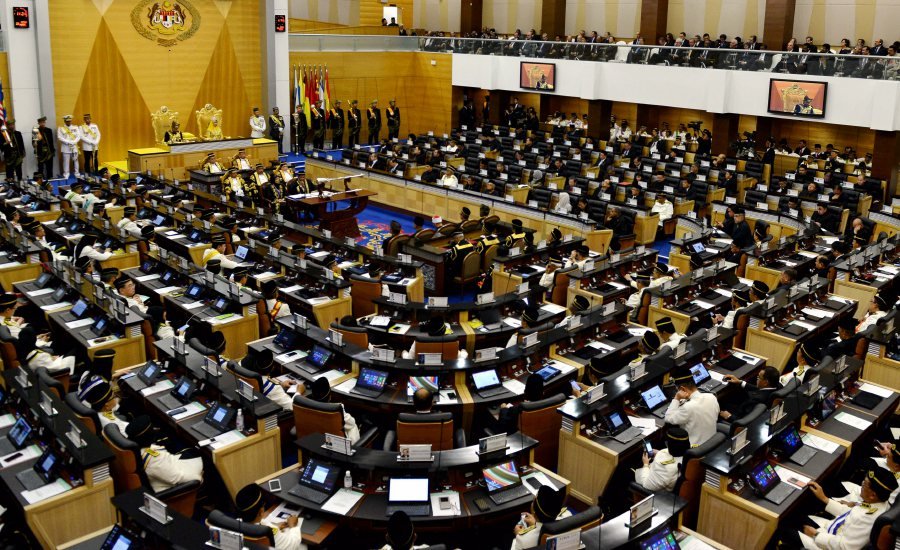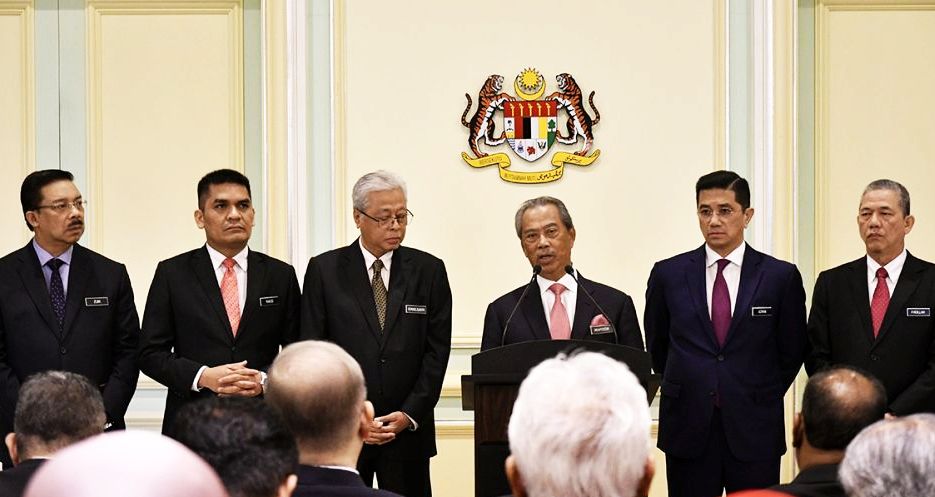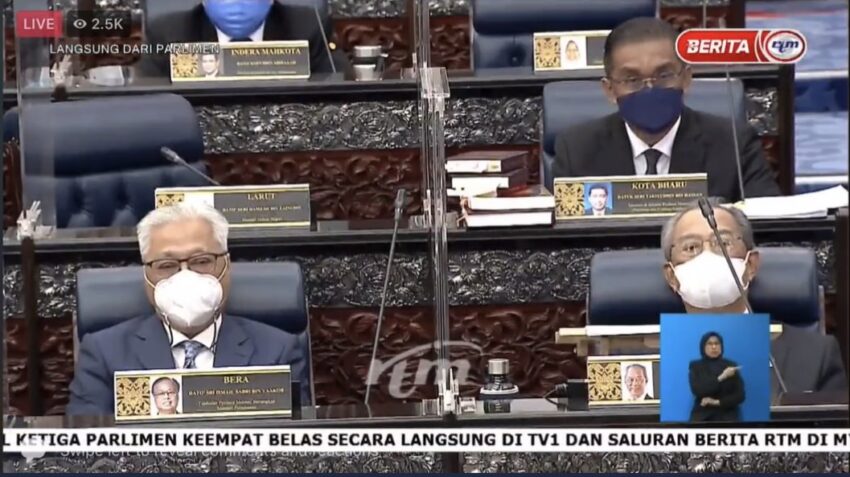Parliament is sitting, but it cannot vote.
There is a Minister of Health, but the nation is sick. There is a Senior Minister for the Economy (among other things), but the economy is none of his business.
There is a Prime Minister, but he does not answer questions.
He is not even in the building.
The charade unfolding in Parliament is merely the most egregious example of the depths to which the Covid-19 pandemic has sunk Malaysian democracy. Or, rather, shows the extent of this administration’s use of the pandemic as an excuse for subverting cardinal principles of representative government. This article will discuss a few of those principles and their transgression.

Parliamentary Accountability
Parliament is the heartbeat of Westminster democracies. The defined endpoint of parliamentary systems is the principle that whether a government lives or dies depends on whether its Prime Minister commands the confidence of a majority of the members of the House of Representatives. But downstream of this principle is the idea that Parliament ought to be the focus of political activity relating to the administration of government.
In Parliament, governments comprised – in large part – of elected representatives account for their policies and activities. In turn, other elected representatives are entitled to pose questions to and require explanations from members of government.
One may question the necessity or value of such theatrics. Yet, all the grandstanding, name-calling, and general disorder fulfils an essential constitutional function. The constitutional centralisation of a single – necessarily limited – platform is by design reductive. Although it cannot hope to capture all of the political activity that is necessary or desirable in a healthy democracy, what it excels is laying bare the nature of our representatives at the highest levels of government. It highlights their priorities and their focus – or lack thereof.
A government’s refusal to convene Parliament in any meaningful sense reveals not only a contempt for democratic processes, but a fear of being revealed as hollow and ineffectual.
But it is not only the government whose conduct in the House should be taken as expressive of its core identity. The same applies for Members of Parliament, who are entrusted with representing the interests of their constituents on the highest public platform. When push comes to shove, it is their conduct in the House that should be taken as representative as expressing their true stance on issues of public importance. Members who seemingly pose robust criticisms of the government on social media but turn and support the same government as a backbench member of a ruling party, ought also be treated as hollow and duplicitous.
Despite the significant changes caused by a Proclamation of Emergency on the ordinary functioning of constitutional government, it is crucial to consider that Article 150(3) Federal Constitution expressly requires them to be laid before Parliament. That is, notwithstanding the primary effect of a Proclamation being that the executive assumes plenary legislative power, Parliament’s function in both scrutinising and legitimating the executive’s acts persists.
This is given further weight by Article 150(3)’s provision for the annulling of Proclamations and Emergency Ordinances through Parliamentary votes. The presence of such a clause makes clear that the subsistence of a state of emergency does not entail a diminished role for Parliament. In particular, the fact that Ordinances can be annulled by Parliament indicates that the Constitution envisages continual Parliamentary scrutiny of executive law-making during an emergency.

Tests of Confidence
Westminster systems are distinct in the fusion between the legislature and the executive. The ruling government, as the party (or group of parties) with a majority in parliament, controls both executive and legislative functions. However, we cannot confuse the order of precedence. The only reason why the executive is granted the ability to control the parliamentary Order Paper is because it presumptively has a majority in the House of Representatives. The Standing Orders’ prioritisation of government business is merely a crystalisation of the practical understanding that the government would be able to win procedural votes on its preferred order of business. To hold otherwise would be a vindication of the charge that Westminster governments are ‘elective dictatorships’.
In fact, the Standing Orders themselves take into account the essential dependence of a government’s possession of a majority to its ability to control the timetable. The statement that government business has precedence is a simplification, as Standing Order 15(1) makes clear that ‘Motion[s] on matters of urgent public importance’ takes precedence over ‘Statements by ministers’ (the category for all government business under the current ‘Special Session’), the ‘Presentation of Government Bills’ and other ‘Public Business’.
The most important motion of that kind is, of course, a motion of no confidence. Therefore, as I have discussed previously, even the prioritisation of government business is subject to the government’s ability, in theory, to pass an express test of its possession of a majority.
But beyond formal votes of confidence, conventional practice is to treat crucial aspects of government policy as ‘matters of confidence’, a lost vote on which should have the same force as a loss on a motion of confidence.
In the present context, there are strong grounds to argue that a government’s position on the continued need for a state of emergency should be treated as an issue of confidence. Such an argument would be supported by the obligation on the government to lay Proclamations of Emergency and Emergency Ordinances before Parliament. More broadly, it is logical that a government’s policy to possess extraordinary legislative powers, not subject to ordinary modes of democratic accountability or legal review, should be treated with the utmost seriousness.
A government that initiates a state of emergency and exercises its powers during one in good faith has little reason to be concerned. The factual existence of a ‘grave emergency’ would be plain for parliamentarians to see. The presence of such an emergency also makes it more likely that expediency was both necessary and desirable.
It is therefore curious that the government, faced with its obligation to lay the Proclamation of Emergency and Ordinances promulgated under it, claims to have advised the His Majesty the King to revoke those instruments, making it no longer possible for them to be laid, scrutinised, and voted on by Parliament. That those instruments were listed on the Order Paper for the sitting on 16 July, and His Majesty denies any advice being given is a whole other matter.

Ministerial Responsibity
Finally, the persistent practice of several senior members of the government in passing responsibility to individuals outside of, and entities apart from, Cabinet is constitutionally objectionable.
Over the past year, the National Security Council has become the focal point for policymaking relating to measures taken to control the Covid-19 pandemic. Yet, one must not lose sight that the Council should be considered a subsidiary entity within the organisation of executive government. It does not have constitutional recognition as it is a statutory body which, in its current form, was created by the National Security Council Act 2016. Although its legal powers are conferred by the Act itself, its constitutional authority is derived through the inclusion of several senior members of Cabinet within its membership. It is those Ministers – and above all the Prime Minister – who are ultimately responsible for its decision-making. To mystify the Council’s role in constitutional government and obscure the answerability of the Ministers who are part of is, at best, disingenuous, or, at worst, actively deceitful.
The same can be said of Cabinet ministers pointing away from themselves when questioned on policies implemented by their own government. Cabinet collective responsibility is enshrined in Article 43(3) of the Federal Constitution. It is the essential bargain of accepting high office that Ministers agree to be accountable for not only the actions taken by themselves and their ministries, but those taken by their colleagues. There is no ‘I’ in government.
Yet, the most unacceptable example of buck-passing under the current government is ministers’ recurring insistence that it is not they who are the authors of policies adopted by the government, but the Director-General for Health. For some ministers, such blame-shifting appears to be instinctual. Yet, the fact that it happens on a daily basis does not make it any less objectionable.
The principle of ministerial responsibility mandates that ministers are the source of decision making power within executive government. A minister may consider guidance from senior civil servants and appointed advisers, but they are wholly and solely responsible for any and all decisions taken. Even where powers are delegated to civil servants in pursuance of more efficient government, the minister is – through the act of delegation and the imposition of departmental policy more generally – responsible for the acts of their subordinates. A Director-General may bring with them a wealth of expertise accumulated through much experience, but they have no constitutional authority to act on their own accord. They may – and should – draw on that experience to advise the minister but, in the end, it is the minister who is democratically accountable.
Conclusion
As Malaysia lurches further into its state of constitutional confusion, we should appreciate that the neglect of democratic principles did not begin at the despatch box. Such disregard is not aberrant for this administration. Rather, it is central. One might even say it is their standard operating procedure.
_______________
Thanks to Tan Kian Leong and Tashny Sukumaran for their comments on an earlier draft. All errors and omissions remain mine.
Shukri Shahizam holds first-class degrees in law from the London School of Economics and the University of Cambridge. He is interested in constitutional law and can be contacted at shukrishahizam@gmail.com or through twitter: https://twitter.com/shukrishahizam.
